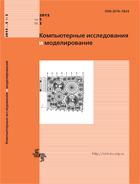All issues
- 2024 Vol. 16
- Issue 1 (special issue)
- 2023 Vol. 15
- 2022 Vol. 14
- 2021 Vol. 13
- 2020 Vol. 12
- 2019 Vol. 11
- 2018 Vol. 10
- 2017 Vol. 9
- 2016 Vol. 8
- 2015 Vol. 7
- 2014 Vol. 6
- 2013 Vol. 5
- 2012 Vol. 4
- 2011 Vol. 3
- 2010 Vol. 2
- 2009 Vol. 1
Ultimate load theorems for rigid plastic solids with internal degrees of freedom and their application in continual lattice shells
This paper studies solids with internal degrees of freedom using the method of Cartan moving hedron. Strain compatibility conditions are derived in the form of structure equations for manifolds. Constitutive relations are reviewed and ultimate load theorems are proved for rigid plastic solids with internal degrees of freedom. It is demonstrated how the above theorems can be applied in behavior analysis of rigid plastic continual shells of shape memory materials. The ultimate loads are estimated for rotating shells under external forces and in case of shape recovery from heating.
- , . Solids composed of thin plates. // Computer Research and Modeling. — 2014. — V. 6, no. 5. — P. 655. DOI: 10.20537/2076-7633-2014-6-5-655-670
Indexed in Scopus
Full-text version of the journal is also available on the web site of the scientific electronic library eLIBRARY.RU
The journal is included in the Russian Science Citation Index
The journal is included in the RSCI
International Interdisciplinary Conference "Mathematics. Computing. Education"







